Schmitt C.B. (ed.) The Cambridge History of Renaissance Philosophy
Подождите немного. Документ загружается.

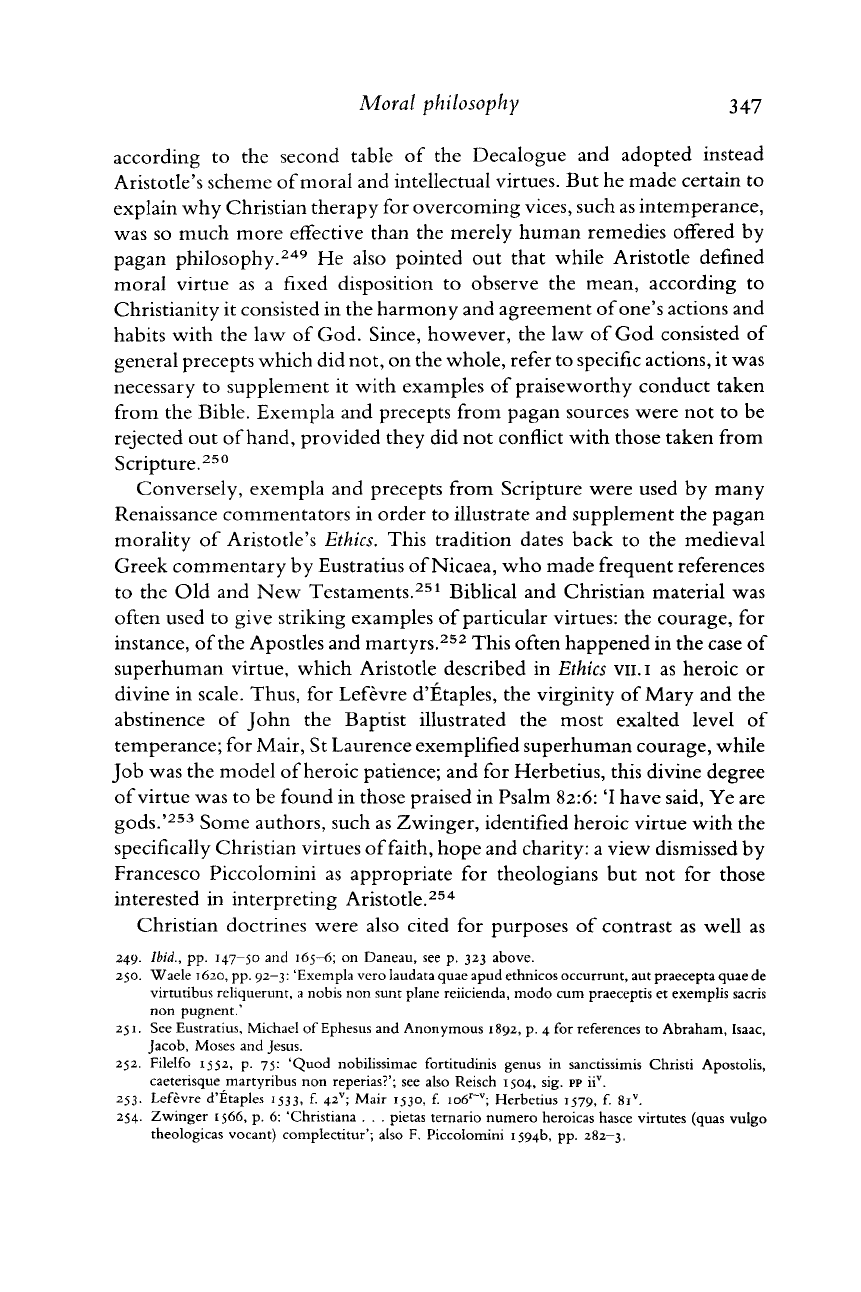
Moral philosophy
347
according
to the
second table
of the
Decalogue
and
adopted instead
Aristotle's
scheme
of
moral
and
intellectual virtues.
But he
made certain
to
explain
why Christian therapy
for
overcoming
vices,
such
as
intemperance,
was
so
much more effective
than
the
merely human remedies offered
by
pagan philosophy.
249
He
also pointed
out that
while Aristotle defined
moral virtue
as a
fixed disposition
to
observe
the
mean, according
to
Christianity
it
consisted
in the
harmony
and
agreement
of
one's actions
and
habits with
the law of
God. Since, however,
the law of
God consisted
of
general precepts which
did
not,
on the
whole, refer
to
specific actions,
it
was
necessary
to
supplement
it
with examples
of
praiseworthy conduct taken
from
the
Bible.
Exempla
and
precepts from pagan sources were
not to be
rejected
out
of
hand,
provided they
did not
conflict with those taken from
Scripture.
250
Conversely,
exempla
and
precepts from Scripture were used
by
many
Renaissance commentators
in
order
to
illustrate
and
supplement
the
pagan
morality
of
Aristotle's Ethics. This tradition dates back
to the
medieval
Greek
commentary
by
Eustratius
of
Nicaea,
who
made frequent references
to
the Old and New
Testaments.
251
Biblical
and
Christian material
was
often used
to
give
striking examples
of
particular virtues:
the
courage,
for
instance,
of
the Apostles
and
martyrs.
252
This often happened
in the
case
of
superhuman virtue, which Aristotle described
in
Ethics
VII.I
as
heroic
or
divine
in
scale. Thus,
for
Lefevre d'Etaples,
the
virginity
of
Mary
and the
abstinence
of John the
Baptist illustrated
the
most exalted
level
of
temperance;
for
Mair,
St
Laurence exemplified superhuman courage, while
Job
was the
model
of
heroic patience;
and for
Herbetius, this divine degree
of
virtue was
to be
found
in
those praised
in
Psalm 82:6:
'I
have said, Ye
are
gods.'
253
Some authors, such
as
Zwinger, identified heroic virtue with
the
specifically
Christian virtues
of
faith, hope
and
charity:
a
view
dismissed
by
Francesco Piccolomini
as
appropriate
for
theologians
but not for
those
interested
in
interpreting Aristotle.
254
Christian doctrines were also cited
for
purposes
of
contrast
as
well
as
249.
Ibid.,
pp. 147-50 and 165-6; on Daneau, see p. 323 above.
250. Waele 1620, pp. 92-3: 'Exempla vero laudata quae apud ethnicos occurrunt, aut praecepta quae de
virtutibus
reliquerunt, a nobis non sunt plane reiicienda, modo cum praeceptis et exemplis sacris
non pugnent.'
251.
See Eustratius, Michael of Ephesus and Anonymous 1892, p. 4 for references to Abraham, Isaac,
Jacob,
Moses and Jesus.
252.
Filelfo 1552, p. 75: 'Quod nobilissimae fortitudinis genus in sanctissimis Christi Apostolis,
caeterisque martyribus non reperias?'; see also Reisch 1504, sig. PP ii
v
.
253.
Lefevre d'Etaples 1533, f. 42
v
;
Mair
1530, f. io6
r-v
; Herbetius 1579, f. 8i
v
.
254. Zwinger 1566, p. 6: 'Christiana . . . pietas ternario numero heroicas hasce virtutes (quas vulgo
theologicas vocant) complectitur'; also F. Piccolomini 1594b, pp. 282-3.
Cambridge Histories Online © Cambridge University Press, 2008
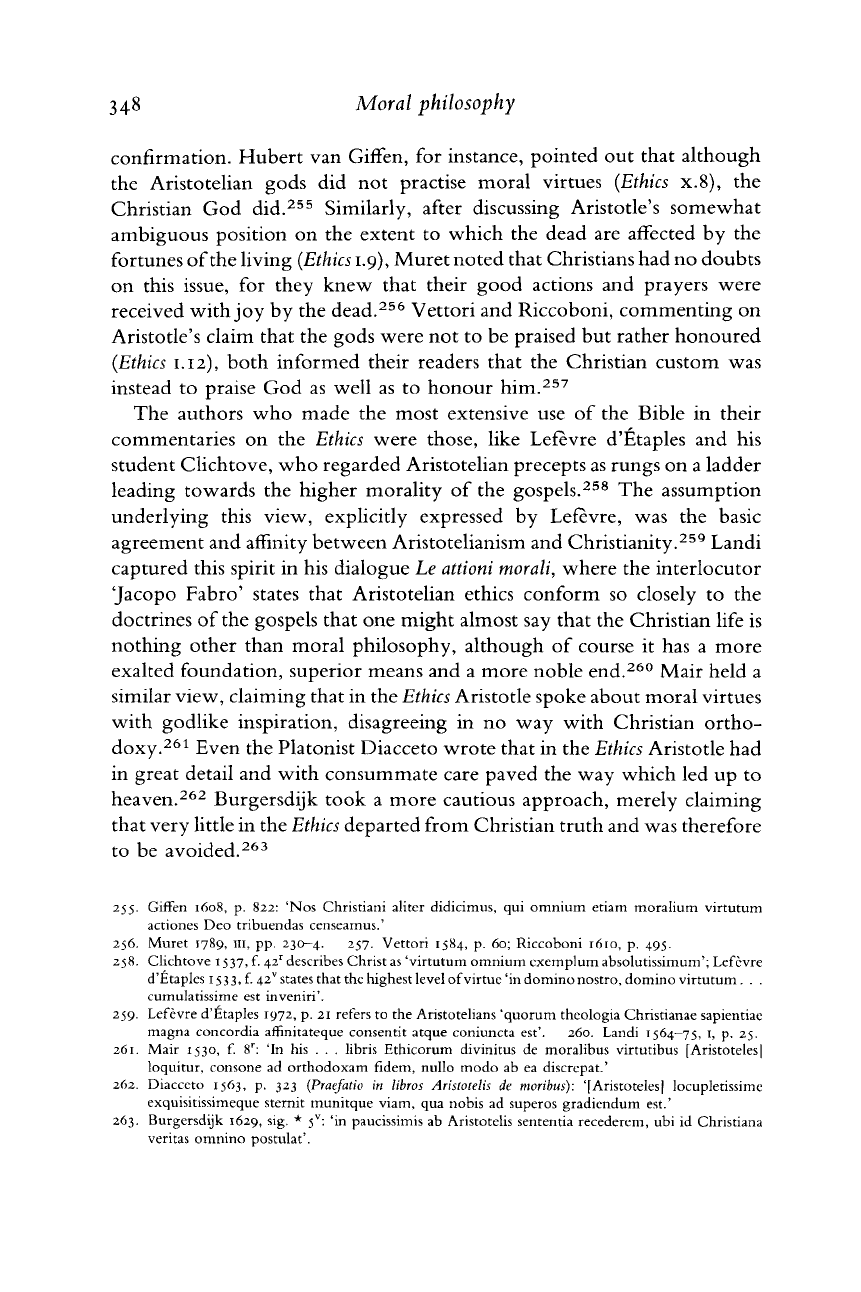
34«
Moral philosophy
confirmation. Hubert van
Giffen,
for instance, pointed out
that
although
the Aristotelian gods did not practise moral virtues (Ethics x.8), the
Christian God did.
255
Similarly, after discussing Aristotle's somewhat
ambiguous position on the extent to which the dead are affected by the
fortunes
of
the
living
(Ethics 1.9), Muret noted
that
Christians had no doubts
on this issue, for they knew
that
their good actions and prayers were
received
with joy by the dead.
256
Vettori and Riccoboni, commenting on
Aristotle's
claim
that
the gods were not to be praised but
rather
honoured
(Ethics
1.12),
both informed their readers
that
the Christian custom was
instead to praise God as
well
as to honour him.
257
The
authors who made the most extensive use of the
Bible
in their
commentaries on the Ethics were those, like
Lefevre
d'Etaples and his
student
Clichtove,
who regarded Aristotelian precepts as rungs on a ladder
leading towards the higher morality of the gospels.
258
The assumption
underlying this
view,
explicitly expressed by
Lefevre,
was the basic
agreement and affinity between Aristotelianism and Christianity.
259
Landi
captured this spirit in his dialogue Le attioni morali, where the interlocutor
'Jacopo Fabro' states
that
Aristotelian ethics conform so
closely
to the
doctrines of the gospels
that
one might almost say
that
the Christian
life
is
nothing other
than
moral philosophy, although of course it has a more
exalted foundation, superior means and a more noble end.
260
Mair held a
similar
view,
claiming
that
in the Ethics Aristotle spoke about moral virtues
with
godlike inspiration, disagreeing in no way with Christian ortho-
doxy.
261
Even the Platonist Diacceto wrote
that
in the Ethics Aristotle had
in great detail and with consummate care paved the way which led up to
heaven.
262
Burgersdijk took a more cautious approach, merely claiming
that
very little in the Ethics departed from Christian
truth
and was therefore
to be avoided.
263
255.
Giffen
1608, p. 822: 'Nos
Christiani
aliter
didicimus,
qui
omnium
etiam
moralium
virtutum
actiones
Deo
tribuendas
censeamus.'
256.
Muret
1789, in, pp.
230-4.
257.
Vettori
1584, p. 60;
Riccoboni
1610, p. 495.
258.
Clichtove
1537, f. 42
r
describes
Christ
as
'virtutum
omnium
exemplum
absolutissimum';
Lefevre
d'Etaples
15
3
3, f. 42
v
states
that
the
highest
level
of
virtue
'in
domino
nostro,
domino
virtutum
. . .
cumulatissime
est
inveniri'.
259.
Lefevre
d'Etaples
1972, p. 21
refers
to the
Aristotelians
'quorum
theologia
Christianae
sapientiae
magna
concordia amnitateque
consentit
atque
coniuncta
est'. 260.
Landi
1564—75,
1, p. 25.
261.
Mair
1530, f. 8
r
: 'In his . . .
libris
Ethicorum
divinitus
de
moralibus
virtutibus
[Aristoteles]
loquitur,
consone
ad
orthodoxam
fidem,
nullo
modo
ab ea
discrepata
262.
Diacceto
1563, p. 323 (Praefatio in libros Aristotelis de moribus):
'[Aristoteles]
locupletissime
exquisitissimeque
sternit
munitque
viam,
qua
nobis
ad
superos
gradiendum
est.'
263.
Burgersdijk
1629, sig. * 5
V
: 'in
paucissimis
ab
Aristotelis
sententia
recederem,
ubi id
Christiana
Veritas
omnino
postulat'.
Cambridge Histories Online © Cambridge University Press, 2008
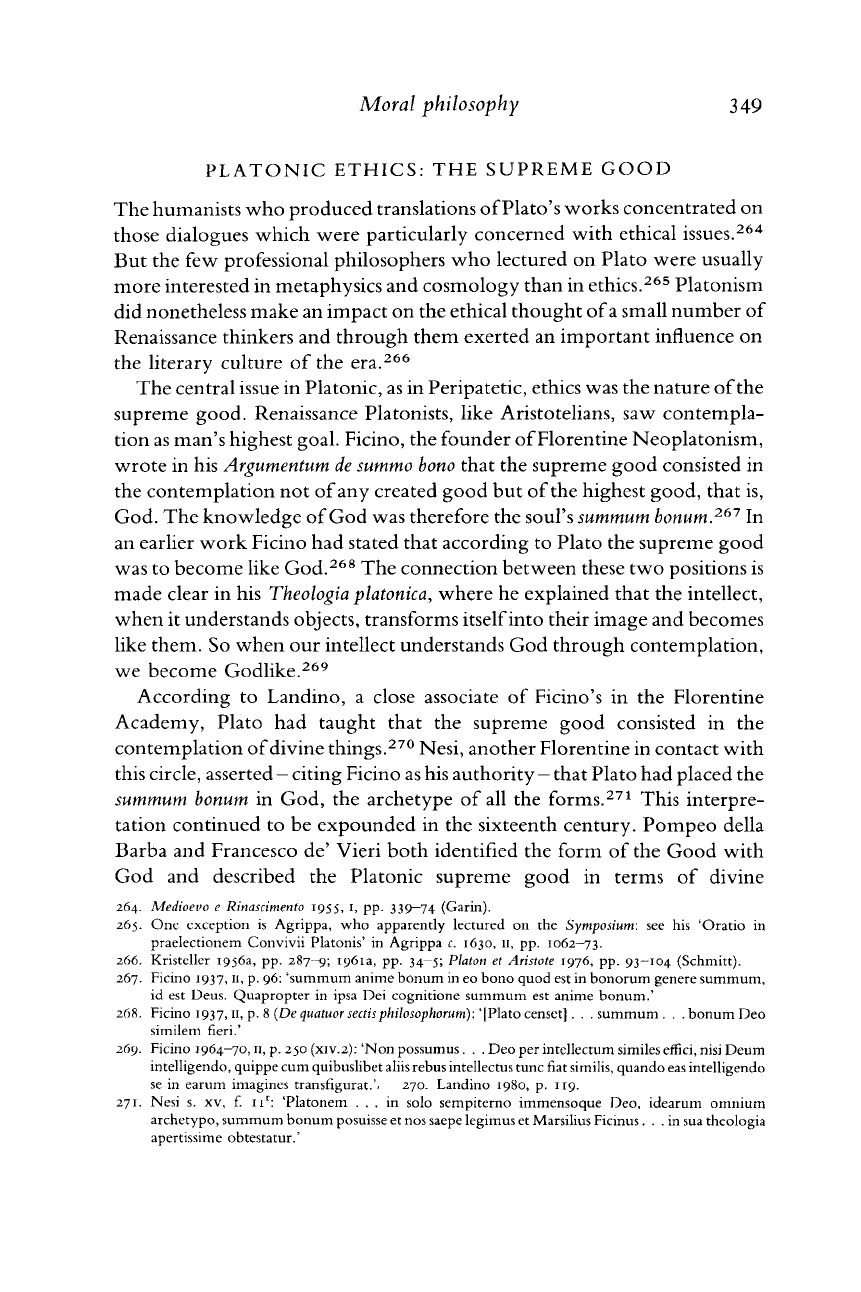
Moral philosophy
349
PLATONIC
ETHICS:
THE
SUPREME
GOOD
The
humanists who produced translations
of
Plato's works concentrated
on
those dialogues which were particularly concerned with ethical issues.
264
But
the few
professional philosophers
who
lectured
on
Plato were usually
more interested
in
metaphysics
and
cosmology than
in
ethics.
265
Platonism
did nonetheless make
an
impact
on the
ethical thought
of
a small number
of
Renaissance thinkers
and
through them exerted
an
important influence
on
the literary culture
of the
era.
266
The
central issue
in
Platonic,
as in
Peripatetic, ethics was
the
nature
of
the
supreme good. Renaissance Platonists, like Aristotelians,
saw
contempla-
tion
as
man's highest
goal.
Ficino,
the
founder
of
Florentine Neoplatonism,
wrote
in his
Argumentum
de
summo
bono
that
the
supreme good consisted
in
the contemplation
not
of
any created good
but of
the highest good,
that
is,
God.
The
knowledge
of
God
was therefore
the
soul's
summum
bonum.
261
In
an earlier work Ficino
had
stated
that
according
to
Plato
the
supreme good
was
to
become like God.
268
The
connection between these
two
positions
is
made clear
in his
Theologia platonica, where
he
explained
that
the
intellect,
when
it
understands objects, transforms
itself
into their image
and
becomes
like
them.
So
when
our
intellect understands
God
through contemplation,
we
become
Godlike.
269
According
to
Landino,
a
close associate
of
Ficino's
in the
Florentine
Academy,
Plato
had
taught
that
the
supreme good consisted
in the
contemplation
of
divine
things.
270
Nesi, another Florentine
in
contact with
this circle, asserted
—
citing Ficino
as his
authority
-
that
Plato
had
placed
the
summum
bonum
in God, the
archetype
of all the
forms.
271
This interpre-
tation continued
to be
expounded
in the
sixteenth century. Pompeo della
Barba
and
Francesco
de'
Vieri
both identified
the
form
of the
Good with
God
and
described
the
Platonic supreme good
in
terms
of
divine
264.
Medioevo
e
Rinascimento
1955, 1, pp. 339—74 (Garin).
265. One exception is
Agrippa,
who apparently lectured on the
Symposium:
see his 'Oratio in
praelectionem
Convivii
Platonis' in
Agrippa
c. 1630, 11, pp. 1062-73.
266. Kristeller 1956a, pp. 287-9;
1961a,
pp. 34-5;
Platon
et
Aristote
1976, pp. 93-104 (Schmitt).
267. Ficino
1937,11,
p. 96: 'summum anime bonum in eo bono quod est in bonorum génère summum,
id est Deus. Quapropter in ipsa Dei cognitione summum est anime bonum.'
268. Ficino 1937, n, p. 8 (De
quatuor sectisphilosophorum):
'[Plato censet]. . . summum . . . bonum Deo
similem fieri.'
269. Ficino
1964-70,11,
p. 250 (xiv.2): 'Non possumus. . . Deo per intellectum
similes
erfici,
nisi
Deum
intelligendo, quippe cum quibuslibet aliis rebus intellectus tunc fiat similis, quando eas intelligendo
se in earum imagines transfigurât.'- 270. Landino 1980, p. 119.
271.
Nesi s. xv, f. u
r
: 'Platonem ... in
solo
sempiterno immensoque Deo, idearum omnium
archetypo,
summum bonum
posuisse
et nos saepe legimus et Marsilius Ficinus... in sua theologia
apertissime obtestatur.'
Cambridge Histories Online © Cambridge University Press, 2008
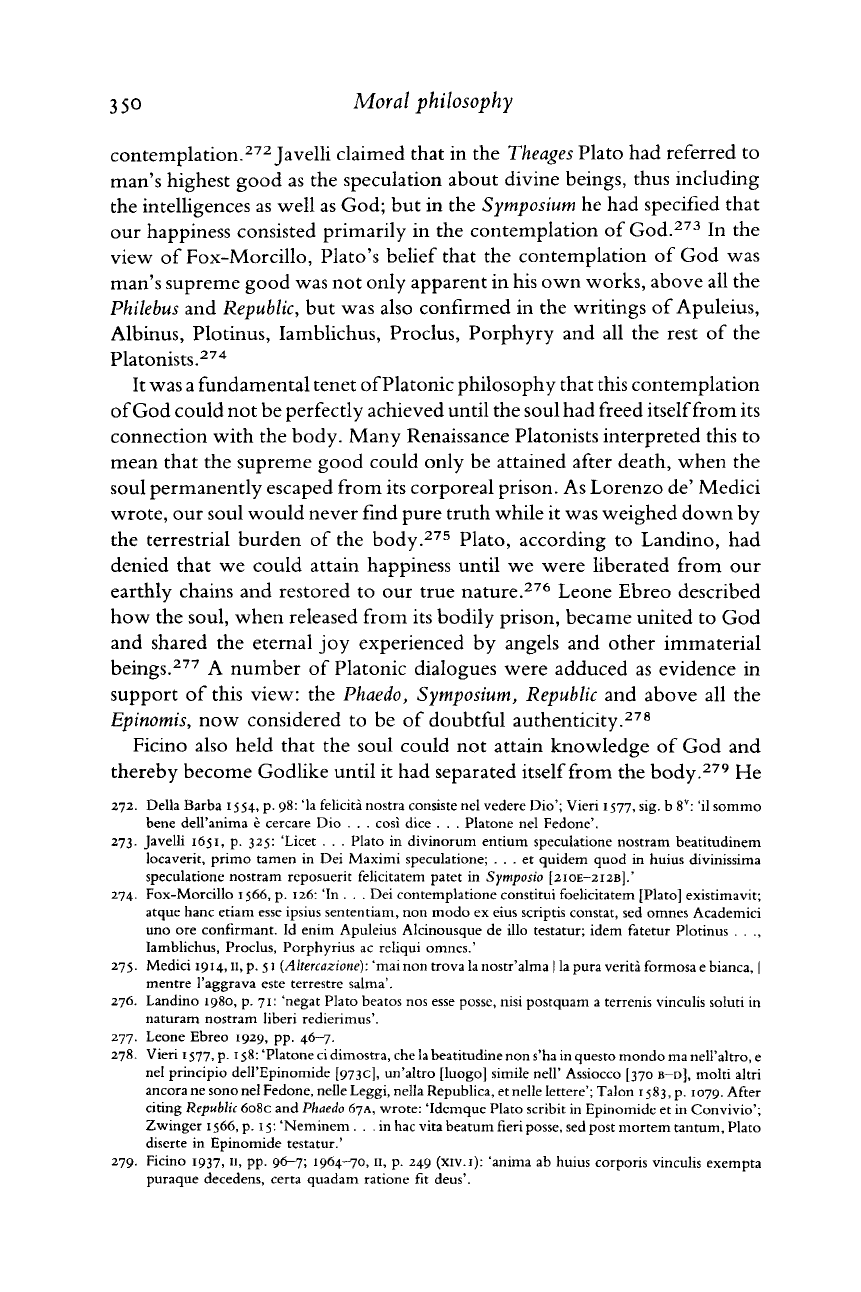
350
Moral philosophy
contemplation.
272
Javelli claimed
that in the
Theages Plato
had
referred
to
man's highest good
as the
speculation about divine beings,
thus
including
the intelligences
as
well
as
God;
but in the
Symposium
he had
specified
that
our happiness consisted primarily
in the
contemplation
of
God.
273
In the
view
of
Fox-Morcillo, Plato's belief
that the
contemplation
of God was
man's supreme good was
not
only
apparent
in his own
works, above
all the
Philebus
and
Republic,
but was
also confirmed
in the
writings
of
Apuleius,
Albinus,
Plotinus, Iamblichus, Proclus, Porphyry
and all the
rest
of the
Platonists.
274
It was
a
fundamental
tenet
of
Platonic philosophy
that
this contemplation
of God
could
not be
perfectly achieved until
the
soul
had
freed
itself
from
its
connection with
the
body. Many Renaissance Platonists
interpreted
this
to
mean
that the
supreme good could only
be
attained after death, when
the
soul permanently escaped from
its
corporeal prison. As Lorenzo
de'
Medici
wrote,
our
soul would never find
pure
truth
while
it
was weighed down
by
the
terrestrial
burden
of the
body.
275
Plato, according
to
Landino,
had
denied
that we
could
attain
happiness until
we
were liberated from
our
earthly chains
and
restored
to our true
nature.
276
Leone Ebreo described
how
the
soul, when released from
its
bodily prison, became united
to God
and shared
the
eternal
joy
experienced
by
angels
and
other immaterial
beings.
277
A
number
of
Platonic dialogues were adduced
as
evidence
in
support
of
this
view:
the
Phaedo,
Symposium,
Republic
and
above
all the
Epinomis,
now
considered
to be of
doubtful authenticity.
278
Ficino also held
that the
soul could
not
attain
knowledge
of God and
thereby become Godlike until
it had
separated
itself
from
the
body.
279
He
272.
Della Barba 1554, p. 98: 'la felicità nostra consiste nel vedere Dio'; Vieri 1577, sig. b 8
V
: 'il sommo
bene dell'anima è cercare Dio . . . così dice . . . Platone nel Fedone'.
273.
Javelli 1651, p. 325: 'Licet . . . Plato in divinorum entium speculatione nostram beatitudinem
locaverit,
primo tamen in Dei Maximi speculatione; ... et quidem quod in huius divinissima
speculatione nostram reposuerit felicitatem patet in
Symposio
[210E-212B].'
274.
Fox-Morcillo 1566, p. 126: 'In . . . Dei contemplatione constimi foelicitatem [Plato] existimavit;
atque
hanc etiam
esse
ipsius sententiam, non modo ex
eius
scriptis constat, sed omnes Academici
uno ore confirmant. Id enim Apuleius Alcinousque de
ilio
testatur; idem fatetur Plotinus . . .,
Iamblichus,
Proclus, Porphyrius ac reliqui omnes.'
275.
Medici
1914,11,
p. 51
(Aìtercazione):
'mai non trova la nostr'alma | la pura verità formosa e bianca, |
mentre l'aggrava
este
terrestre salma'.
276.
Landino 1980, p. 71: 'negat Plato beatos nos
esse
posse,
nisi
postquam a terrenis vinculis soluti in
naturam
nostram liberi redierimus'.
277.
Leone Ebreo 1929, pp. 46-7.
278.
Vieri
1577,
p. 158: 'Platone ci dimostra, che la beatitudine non s'ha in questo mondo ma nell'altro, e
nel principio dell'Epinomide [973c], un'altro [luogo] simile nell' Assiocco [370
B-D],
molti altri
ancora ne
sono
nel Fedone, nelle
Leggi,
nella Republica, et nelle lettere'; Talon 1583, p. 1079. After
citing
Republic
608c
and
Phaedo
67A, wrote: 'Idemque Plato scribit in Epinomide et in Convivio';
Zwinger
1566, p. 15: 'Neminem ... in hac vita beatum fieri posse, sed post mortem tantum, Plato
diserte in Epinomide testatur.'
279.
Ficino 1937, 11, pp. 96-7; 1964-70, 11, p. 249 (xiv.i): 'anima ab huius corporis vinculis exempta
puraque
decedens, certa quadam ratione fit deus'.
Cambridge Histories Online © Cambridge University Press, 2008
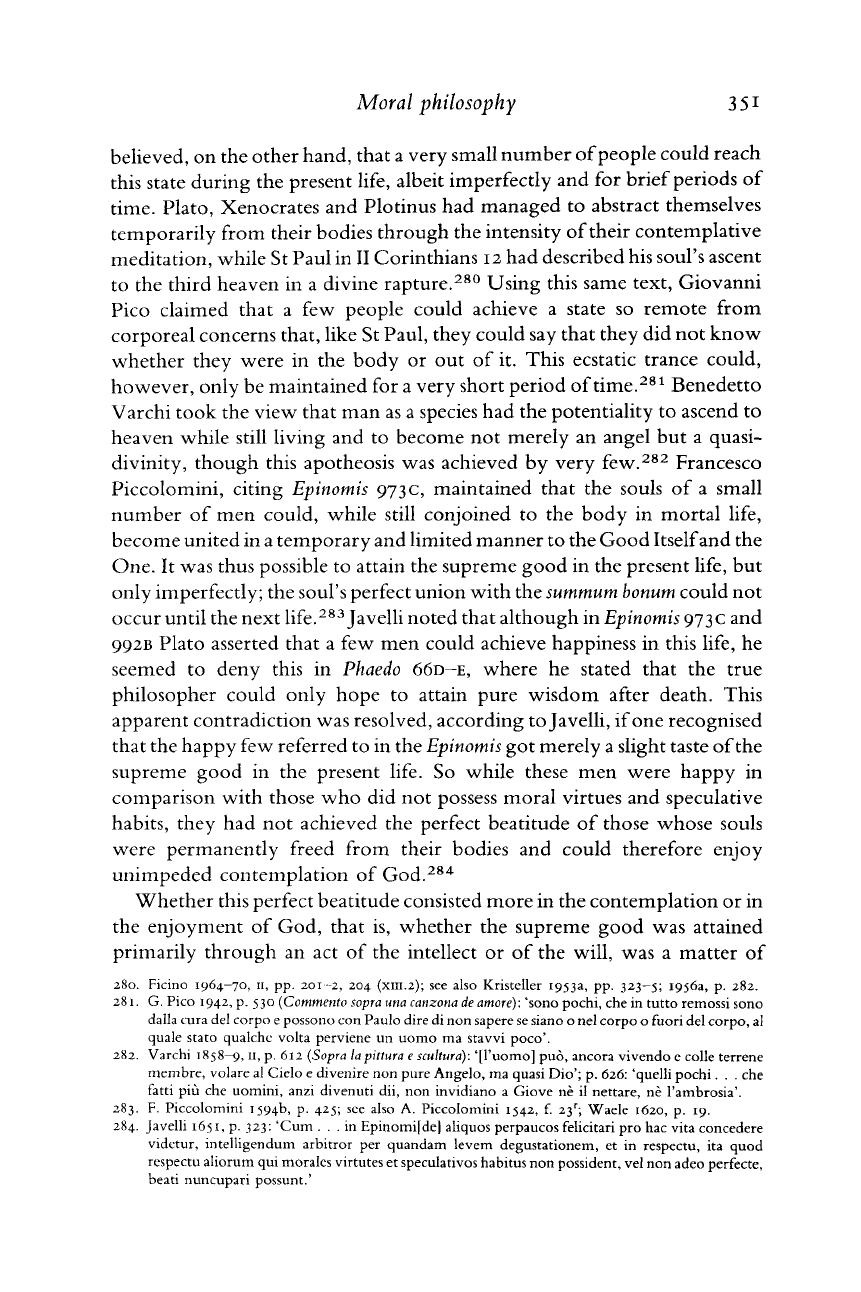
Moral philosophy
351
believed,
on the other hand,
that
a very small number
of
people could reach
this state during the present
life,
albeit imperfectly and for brief periods of
time. Plato, Xenocrates and Plotinus had managed to abstract themselves
temporarily from their bodies through the intensity
of
their contemplative
meditation, while St Paul in II Corinthians 12 had described his soul's ascent
to the third heaven in a divine rapture.
280
Using this same text, Giovanni
Pico
claimed
that
a few people could achieve a state so remote from
corporeal concerns
that,
like St Paul, they could say
that
they did not know
whether they were in the body or out of it. This ecstatic trance could,
however,
only be maintained for a very short period
of
time.
281
Benedetto
Varchi
took the
view
that
man as a species had the potentiality to ascend to
heaven
while still living and to become not merely an angel but a quasi-
divinity,
though this apotheosis was achieved by very
few.
282
Francesco
Piccolomini,
citing Epinomis 973c, maintained
that
the souls of a small
number of men could, while still conjoined to the body in mortal
life,
become
united in a temporary and limited manner to the Good
Itself
and the
One.
It was thus possible to attain the supreme good in the present
life,
but
only
imperfectly; the soul's perfect union with the
summum
bonum could not
occur
until the next
life.
283
Javelli
noted
that
although in Epinomis 973c and
992B
Plato asserted
that
a few men could achieve happiness in this
life,
he
seemed to deny this in Phaedo
66D—E,
where he stated
that
the
true
philosopher could only hope to attain pure wisdom after death. This
apparent contradiction was resolved, according to
Javelli,
if
one recognised
that
the happy few referred to in the Epinomis got merely a slight taste
of
the
supreme good in the present
life.
So while these men were happy in
comparison with those who did not possess moral virtues and speculative
habits, they had not achieved the perfect beatitude of those whose souls
were
permanently freed from their bodies and could therefore enjoy
unimpeded contemplation of God.
284
Whether this perfect beatitude consisted more in the contemplation or in
the enjoyment of God,
that
is, whether the supreme good was attained
primarily through an act of the intellect or of the
will,
was a matter of
280.
Ficino
1964-70,
11, pp.
201-2,
204
(xin.2);
see
also
Kristeller
1953a,
pp.
323-5;
1956a,
p. 282.
281. G.
Pico
I94
2
,
P- 53° (Commento sopra una canzona de amore):
'sono
pochi,
che in
tutto
remossi
sono
dalla
cura
del
corpo
e
possono
con
Paulo
dire
di non
sapere
se
siano
o nel
corpo
o
fuori
del
corpo,
al
quale
stato
qualche
volta
perviene
un
uomo
ma
stavvi
poco'.
282.
Varchi
1858—9,11, p. 612 (Sopra la pittura e scultura):
'[l'uomo]
può,
ancora
vivendo
e
colle
terrene
membre,
volare
al
Cielo
e
divenire
non
pure
Angelo,
ma
quasi
Dio'; p. 626:
'quelli
pochi.
. . che
fatti
più che
uomini,
anzi
divenuti
dii, non
invidiano
a
Giove
nè il
nettare,
nè
l'ambrosia'.
283. F.
Piccolomini
1594b,
p. 425; see
also
A.
Piccolomini
1542, f. 23
1
";
Waele
1620, p. 19.
284.
Javelli
1651, p. 323: 'Cum ... in
Epinomifde]
aliquos
perpaucos
felicitari
pro hac
vita
concedere
videtur,
intelligendum
arbitror
per
quandam
levem
degustationem,
et in
respectu,
ita
quod
respectu
aliorum
qui
morales
virtutes
et
speculativos
habitus
non
possident,
vel non
adeo
perfecte,
beati
nuncupari
possunt.'
Cambridge Histories Online © Cambridge University Press, 2008
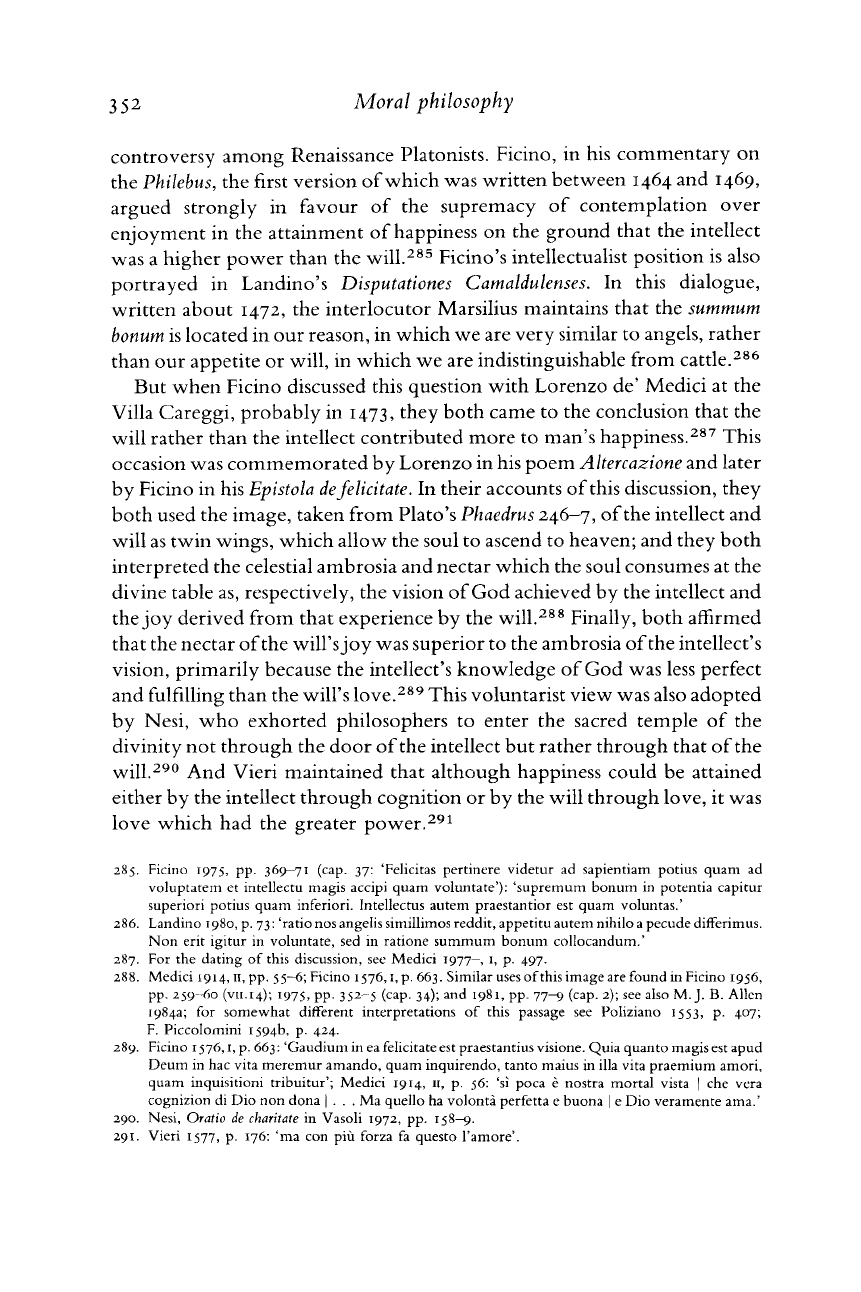
352
Moral philosophy
controversy among Renaissance Platonists. Ficino,
in his
commentary
on
the Philebus,
the
first version
of
which
was written between 1464
and
1469,
argued strongly
in
favour
of the
supremacy
of
contemplation over
enjoyment
in the
attainment
of
happiness
on the
ground
that the
intellect
was
a
higher power
than
the
will.
285
Ficino's intellectualist position
is
also
portrayed
in
Landino's Disputationes Camaldulenses.
In
this dialogue,
written about 1472,
the
interlocutor Marsilius maintains
that the summum
bonum
is
located
in our
reason,
in
which
we are
very similar
to
angels,
rather
than
our
appetite
or
will,
in
which
we are
indistinguishable from cattle.
286
But
when Ficino discussed this question with Lorenzo
de'
Medici
at the
Villa
Careggi,
probably
in
1473, they both came
to the
conclusion
that the
will
rather
than
the
intellect contributed more
to
man's happiness.
287
This
occasion
was commemorated
by
Lorenzo
in
his poem Altercazione
and
later
by
Ficino
in his
Epistola de felicitate.
In
their accounts
of
this discussion, they
both used
the
image, taken from Plato's Phaedrus 246—7,
of
the intellect
and
will
as
twin
wings,
which allow
the
soul
to
ascend
to
heaven;
and
they both
interpreted
the
celestial ambrosia
and
nectar which
the
soul consumes
at the
divine table as, respectively,
the
vision
of
God
achieved
by the
intellect
and
the joy derived from
that
experience
by the
will.
288
Finally, both affirmed
that
the
nectar
of
the
will's
joy
was superior
to the
ambrosia
of
the intellect's
vision,
primarily because
the
intellect's knowledge
of
God
was
less perfect
and
fulfilling
than
the
will's
love.
289
This voluntarist
view
was also adopted
by
Nesi,
who
exhorted philosophers
to
enter
the
sacred temple
of the
divinity
not
through
the
door
of
the intellect
but
rather
through
that
of
the
will.
290
And
Vieri
maintained
that
although happiness could
be
attained
either
by the
intellect through cognition
or by the
will
through
love,
it was
love
which
had the
greater power.
291
285. Ficino 1975, pp. 369-71 (cap. 37: 'Felicitas pertinere videtur ad sapientiam potius quam ad
voluptatem et intellectu magis accipi quam volúntate'): 'supremum bonum in potentia capitur
superiori potius quam inferiori. Intellectus autem praestantior est quam voluntas.'
286. Landino 1980, p. 73: 'ratio nos angelis
simillimos
reddit, appetitu autem nihilo a pecude differimus.
Non erit igitur in volúntate, sed in ratione summum bonum collocandum.'
287. For the dating of this discussion, see Medici
1977-,
1, p. 497.
288. Medici
1914,11,
pp. 55-6; Ficino 1576,1^.663. Similar
uses
of this image are found in Ficino 1956,
pp.
259-60
(VII.
14);
1975, pp. 352-5 (cap. 34); and 1981, pp. 77-9 (cap. 2); see
also
M.J. B. Allen
1984a; for somewhat different interpretations of this passage see Poliziano 1553, p. 407;
F.
Piccolomini 1594b, p. 424.
289. Ficino
1576,1,
p. 663
:
'Gaudium in ea felicitate est praestantius visione. Quia quanto magis est apud
Deum in hac vita meremur amando, quam inquirendo, tanto maius in ilia vita praemium amori,
quam
inquisitioni tribuitur'; Medici 1914, 11, p. 56: 'sì poca è nostra mortal vista | che vera
cognizion di Dio non dona | . . . Ma quello ha volontà perfetta e buona | e Dio veramente ama.'
290. Nesi,
Огайо
de
chántate
in Vasoli 1972, pp. 158-9.
291.
Vieri 1577, p. 176: 'ma con più forza fa questo l'amore'.
Cambridge Histories Online © Cambridge University Press, 2008
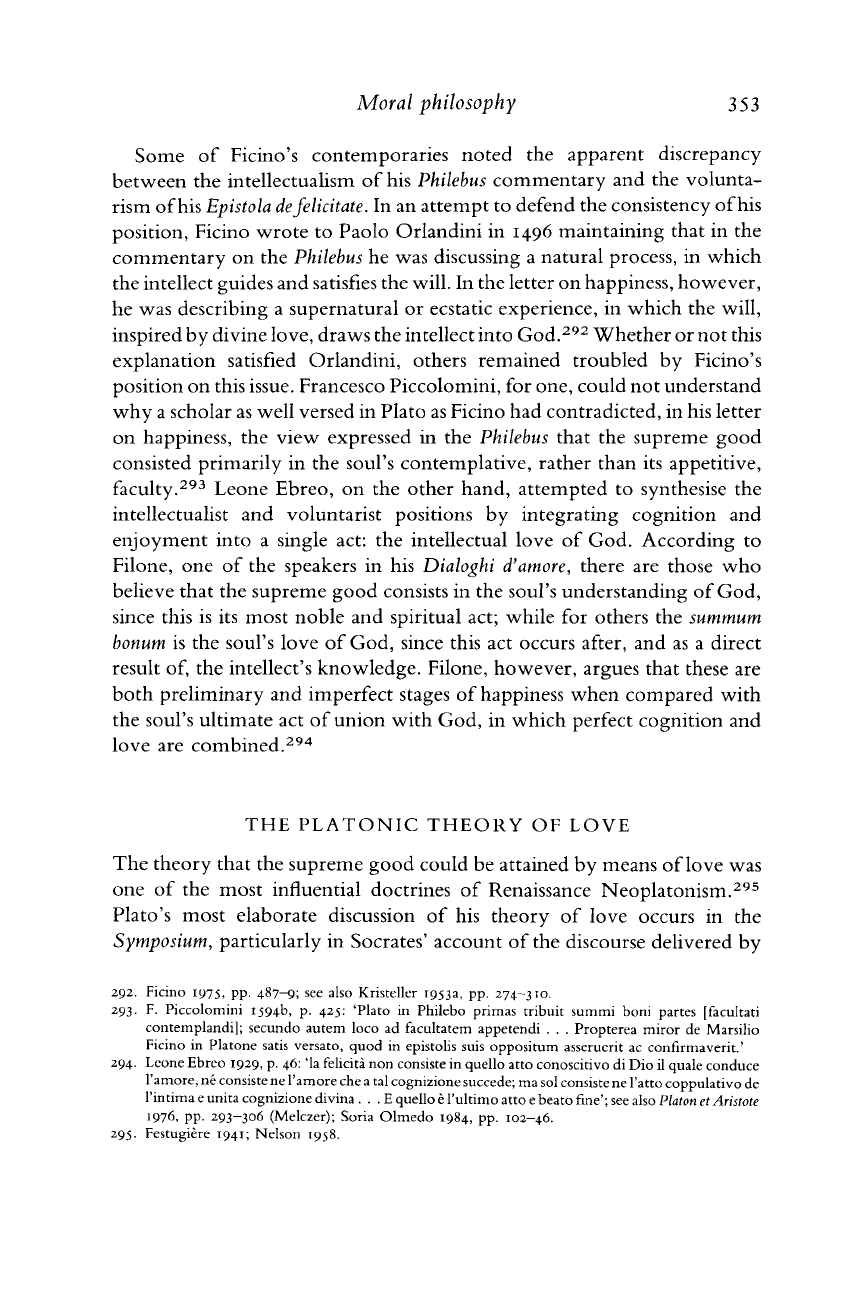
Moral philosophy
353
Some
of
Ficino's contemporaries noted
the
apparent discrepancy
between
the
intellectualism
of his
Philebus commentary
and the
volunta-
rism
of
his Epistola de felicitate.
In an
attempt
to
defend
the
consistency
of
his
position, Ficino wrote
to
Paolo Orlandini
in
1496 maintaining
that in the
commentary
on the
Philebus
he was
discussing
a
natural process,
in
which
the intellect guides
and
satisfies
the
will.
In the
letter
on
happiness, however,
he
was
describing
a
supernatural
or
ecstatic experience,
in
which
the
will,
inspired
by
divine
love,
draws
the
intellect into God.
292
Whether
or not
this
explanation satisfied Orlandini, others remained troubled
by
Ficino's
position
on
this issue. Francesco Piccolomini,
for
one, could
not
understand
why
a
scholar
as
well
versed
in
Plato
as
Ficino
had
contradicted,
in his
letter
on happiness,
the
view
expressed
in the
Philebus
that the
supreme good
consisted primarily
in the
soul's contemplative,
rather
than
its
appetitive,
faculty.
293
Leone Ebreo,
on the
other hand, attempted
to
synthesise
the
intellectualist
and
voluntarist positions
by
integrating cognition
and
enjoyment into
a
single
act: the
intellectual
love
of
God. According
to
Filone,
one of the
speakers
in his
Dialoghi d'amore,
there
are
those
who
believe
that the
supreme good consists
in the
soul's understanding
of
God,
since this
is its
most noble
and
spiritual
act;
while
for
others
the summum
bonum
is the
soul's
love
of
God, since this
act
occurs after,
and as a
direct
result
of, the
intellect's knowledge. Filone, however, argues
that
these
are
both preliminary
and
imperfect stages
of
happiness when compared with
the soul's ultimate
act of
union with God,
in
which perfect cognition
and
love
are
combined.
294
THE
PLATONIC
THEORY
OF
LOVE
The
theory
that the
supreme good could
be
attained
by
means
of
love
was
one
of the
most influential doctrines
of
Renaissance Neoplatonism.
295
Plato's most elaborate discussion
of his
theory
of
love
occurs
in the
Symposium, particularly
in
Socrates' account
of the
discourse delivered
by
292. Ficino 1975, PP- 487-9; see also Kristeller 1953a, pp. 274-310.
293. F. Piccolomini 1594b, p. 425: 'Plato in Philebo primas tribuit summi boni partes [facultati
contemplandi]; secundo autem loco ad facultatem appetendi . . . Propterea miror de Marsilio
Ficino in Platone satis versato, quod in epistolis
suis
oppositum asseruerit ac confirmaverit.'
294. Leone Ebreo 1929, p- 46: ia felicità non consiste in quello atto conoscitivo di Dio il quale conduce
l'amore, né consiste ne l'amore che a tal cognizione succede; ma sol consiste ne l'atto coppulativo de
l'intima e unita cognizione divina ... E quello è l'ultimo atto e beato fine'; see also
Platon
et
Aristote
1976,
pp.
293-306
(Melczer); Soria Olmedo 1984, pp. 102-46.
295. Festugière 1941; Nelson 1958.
Cambridge Histories Online © Cambridge University Press, 2008
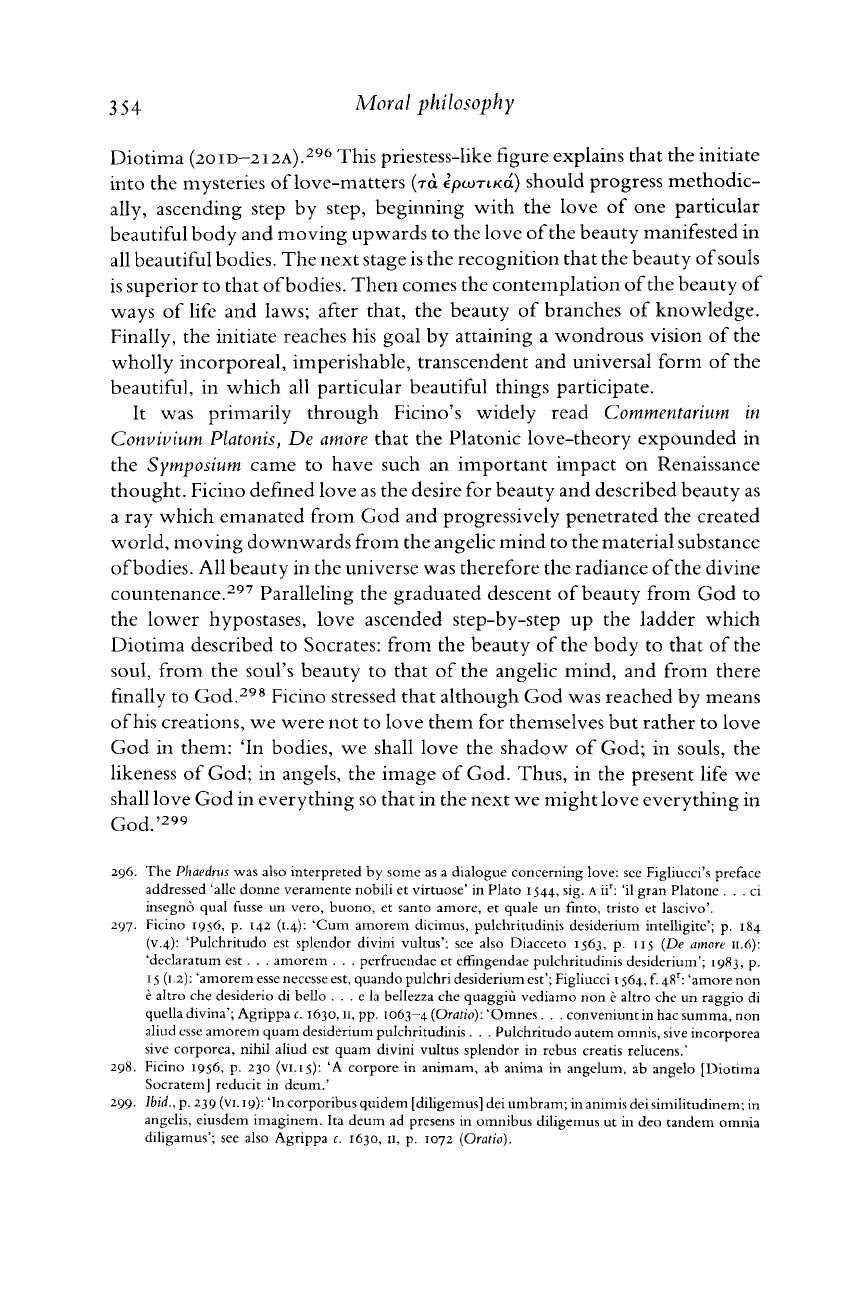
354
Moral philosophy
Diotima
(201D-212A).
296
This priestess-like figure explains
that the
initiate
into
the
mysteries
of
love-matters
(ra
ipcjriKa) should progress methodic-
ally,
ascending step
by
step, beginning with
the
love
of one
particular
beautiful body
and
moving upwards
to the
love
of
the beauty manifested
in
all
beautiful bodies. The next stage is
the
recognition
that the
beauty
of
souls
is
superior
to that
of
bodies.
Then comes
the
contemplation
of
the beauty
of
ways
of
life
and
laws;
after
that, the
beauty
of
branches
of
knowledge.
Finally,
the
initiate reaches
his
goal
by
attaining
a
wondrous vision
of the
wholly
incorporeal, imperishable, transcendent
and
universal form
of the
beautiful,
in
which
all
particular beautiful things participate.
It
was
primarily through Ficino's widely read Commentarium
in
Convivium Platonis,
De
amore
that the
Platonic love-theory expounded
in
the
Symposium
came
to
have such
an
important impact
on
Renaissance
thought. Ficino defined love
as the
desire
for
beauty
and
described beauty
as
a
ray
which emanated from
God and
progressively penetrated
the
created
world,
moving downwards from
the
angelic mind
to the
material substance
of
bodies.
All beauty
in the
universe was therefore
the
radiance
of
the divine
countenance.
297
Paralleling
the
graduated descent
of
beauty from
God to
the lower hypostases, love ascended step-by-step
up the
ladder which
Diotima
described
to
Socrates: from
the
beauty
of the
body
to that of the
soul,
from
the
soul's beauty
to that of the
angelic mind,
and
from
there
finally
to
God.
298
Ficino stressed
that
although
God
was reached
by
means
of
his creations,
we
were
not to
love them
for
themselves
but
rather
to
love
God
in
them:
'In
bodies,
we
shall love
the
shadow
of
God;
in
souls,
the
likeness
of
God;
in
angels,
the
image
of
God. Thus,
in the
present
life
we
shall love God
in
everything
so that in the
next
we
might love everything
in
God.'
299
296. The
Phaedrus
was
also
interpreted by
some
as a dialogue concerning love: see Figliucci's preface
addressed 'alle donne veramente nobili et virtuose' in Plato 1544, sig. A ii
r
: 'il gran Platone ... ci
insegnò qual
fusse
un vero, buono, et santo amore, et quale un finto, tristo et lascivo'.
297. Ficino 1956, p. 142 (1.4)'- 'Cum amorem dicimus, pulchritudinis desiderium intelligite'; p. 184
(v.4): 'Pulchritudo est splendor divini vultus'; see
also
Diacceto 1563, p. 115 (De
amore 11.6):
'declaratum
est . . . amorem . . . perfruendae et effingendae pulchritudinis desiderium'; 1983, p.
15
(1.2): 'amorem
esse
necesse
est, quando pulchri desiderium est'; Figliucci 1564, f. 48
r
: 'amore non
è altro che desiderio di bello ... e la bellezza che quaggiù vediamo non è altro che un raggio di
quella divina'; Agrippa c.
1630,11,
pp. 1063-4
(Orario):
'Omnes . . . conveniunt in hac summa, non
aliud
esse
amorem quam desiderium pulchritudinis . . . Pulchritudo autem omnis, sive incorporea
sive corporea, nihil aliud est quam divini vultus splendor in rebus creatis relucens.'
298. Ficino 1956, p. 230 (vi.
15):
'A corpore in animam, ab anima in angelum, ab angelo [Diotima
Socratem] reducit in deum.'
299.
Ibid.,
p. 239 (vi. 19): 'In corporibus quidem [diligemus] dei umbram; in animis dei similitudinem; in
angelis, eiusdem imaginem. Ita deum ad presens in omnibus diligemus ut in deo tandem omnia
diligamus';
see
also
Agrippa c. 1630, 11, p. 1072
(Orario).
Cambridge Histories Online © Cambridge University Press, 2008
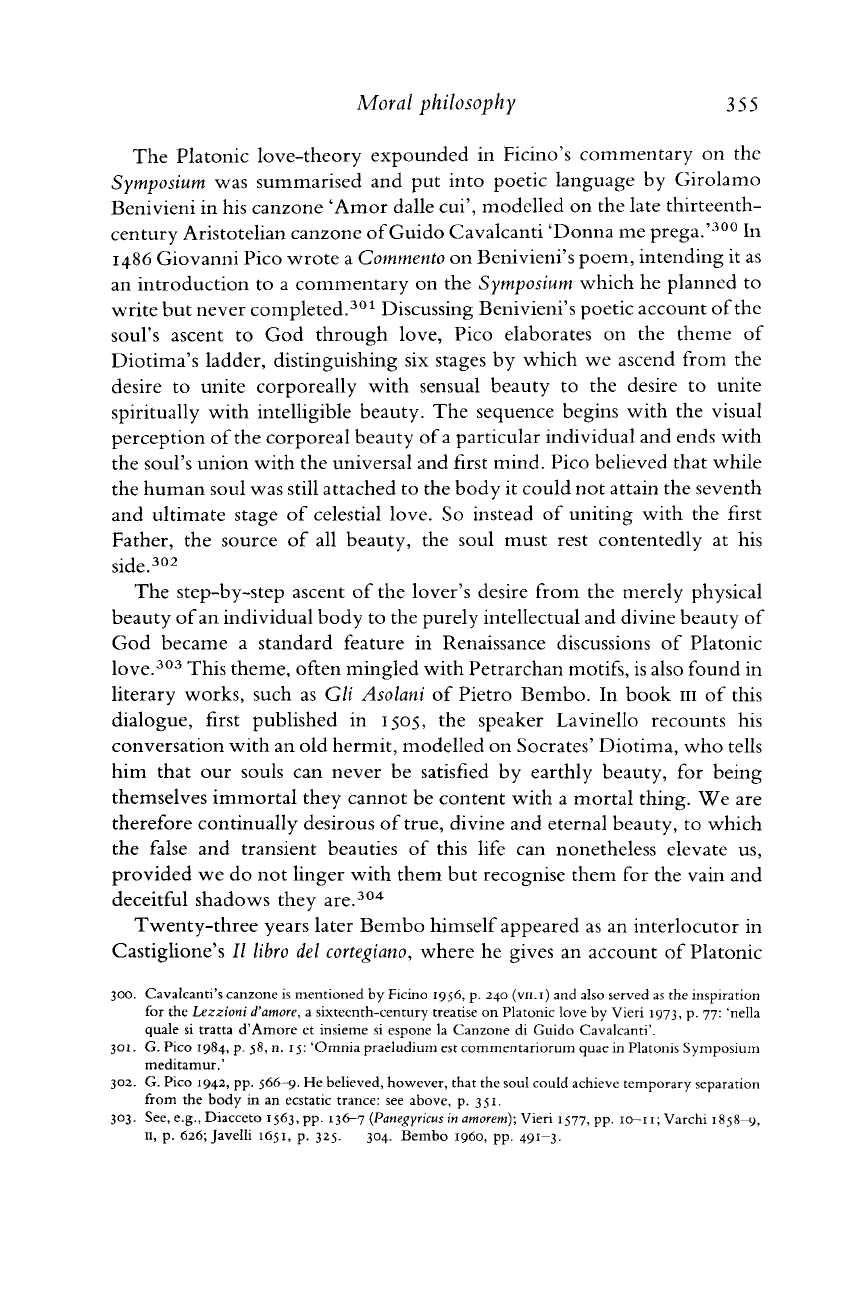
Moral philosophy
355
The
Platonic love-theory expounded in Ficino's commentary on the
Symposium
was summarised and put into poetic language by Girolamo
Benivieni
in his canzone 'Amor dalle cui\ modelled on the late thirteenth-
century Aristotelian canzone
of
Guido
Cavalcanti 'Donna me prega.'
300
In
i486 Giovanni Pico wrote a Commento on Benivieni's poem, intending it as
an introduction to a commentary on the
Symposium
which he planned to
write but never completed.
301
Discussing Benivieni's poetic account
of
the
soul's ascent to God through
love,
Pico elaborates on the theme of
Diotima's ladder, distinguishing six stages by which we ascend from the
desire to unite corporeally with sensual beauty to the desire to unite
spiritually with intelligible beauty. The sequence begins with the visual
perception
of
the corporeal beauty of a particular individual and ends with
the soul's union with the universal and first mind. Pico believed
that
while
the human soul was still attached to the body it could not attain the seventh
and ultimate stage of celestial
love.
So instead of uniting with the first
Father, the source of all beauty, the soul must rest contentedly at his
side.
302
The
step-by-step ascent of the lover's desire from the merely physical
beauty
of
an individual body to the purely intellectual and divine beauty of
God
became a standard feature in Renaissance discussions of Platonic
love.
303
This theme, often mingled with Petrarchan motifs, is also found in
literary works, such as Gli Asolani of Pietro Bembo. In book m of this
dialogue,
first published in 1505, the speaker Lavinello recounts his
conversation with an old hermit, modelled on Socrates' Diotima, who tells
him
that
our souls can never be satisfied by earthly beauty, for being
themselves immortal they cannot be content with a mortal thing. We are
therefore continually desirous of true, divine and eternal beauty, to which
the false and transient beauties of this
life
can nonetheless elevate us,
provided we do not linger with them but recognise them for the vain and
deceitful
shadows they are.
304
Twenty-three years later Bembo himself appeared as an interlocutor in
Castiglione's
// libro del cortegiano, where he
gives
an account of Platonic
300.
Cavalcanti's
canzone
is
mentioned
by
Ficino
1956, p. 240
(VII.I)
and
also
served
as the
inspiration
for the Lezzioni d'amore, a
sixteenth-century
treatise
on
Platonic
love
by
Vieri
1973, p. 77:
'nella
quale
si
tratta
d'Amore
et
insieme
si
espone
la
Canzone
di
Guido
Cavalcanti'.
301. G.
Pico
1984, p. 58, n. 15:
'Omnia
praeludium
est
commentariorum
quae
in
Platonis
Symposium
meditamur.'
302. G.
Pico
1942, pp.
566—9.
He
believed,
however,
that
the
soul
could
achieve
temporary
separation
from
the
body
in an
ecstatic
trance:
see
above,
p. 351.
303. See, e.g.,
Diacceto
1563, pp. 136-7 (Panegyricus in amorem);
Vieri
1577, pp. 10-11;
Varchi
1858-9,
11,
p. 626;
Javelli
1651, p. 325. 304.
Bembo
i960,
pp.
491-3.
Cambridge Histories Online © Cambridge University Press, 2008
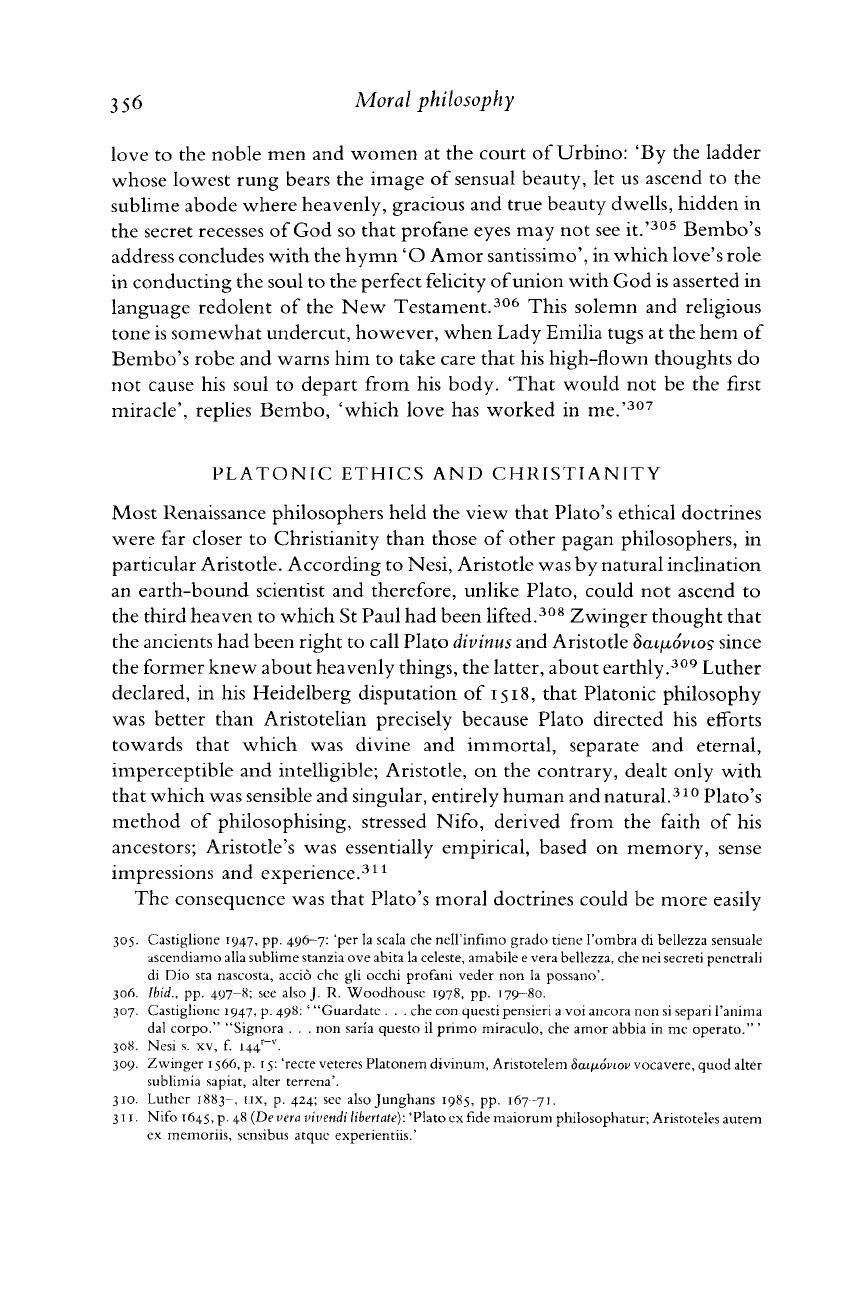
356
Moral philosophy
love
to the
noble
men and
women
at the
court
of
Urbino:
'By the
ladder
whose
lowest rung bears
the
image
of
sensual beauty,
let us
ascend
to the
sublime abode where heavenly, gracious
and
true
beauty dwells, hidden
in
the secret recesses
of
God
so
that
profane eyes
may not see
it.'
305
Bembo's
address concludes with
the
hymn
4
O
Amor santissimo',
in
which love's role
in conducting
the
soul
to the
perfect felicity
of
union with God
is
asserted
in
language redolent
of the New
Testament.
306
This solemn
and
religious
tone
is
somewhat undercut, however, when Lady Emilia tugs
at the hem of
Bembo's
robe
and
warns
him to
take care
that
his
high-flown thoughts
do
not cause
his
soul
to
depart
from
his
body. 'That would
not be the
first
miracle', replies Bembo, 'which love
has
worked
in
me.'
307
PLATONIC
ETHICS
AND
CHRISTIANITY
Most
Renaissance philosophers held
the
view
that
Plato's ethical doctrines
were
far
closer
to
Christianity
than
those
of
other pagan philosophers,
in
particular Aristotle. According
to
Nesi, Aristotle was
by
natural
inclination
an earth-bound scientist
and
therefore, unlike Plato, could
not
ascend
to
the
third
heaven
to
which
St
Paul
had
been lifted.
308
Zwinger thought
that
the ancients
had
been right
to
call Plato divinus
and
Aristotle
Saifxavios
since
the former knew about heavenly things,
the
latter,
about earthly.
309
Luther
declared,
in his
Heidelberg disputation
of
1518,
that
Platonic philosophy
was
better
than
Aristotelian precisely because Plato directed
his
efforts
towards
that
which
was
divine
and
immortal, separate
and
eternal,
imperceptible
and
intelligible; Aristotle,
on the
contrary, dealt only with
that
which was sensible
and
singular, entirely human
and
natural.
310
Plato's
method
of
philosophising, stressed
Nifo,
derived from
the
faith
of his
ancestors; Aristotle's
was
essentially empirical, based
on
memory, sense
impressions
and
experience.
311
The
consequence
was
that
Plato's moral doctrines could
be
more easily
305. Castiglione 1947, pp. 496—7: 'per la scala che neH'infimo grado
tiene
l'ombra di bellezza
sensuale
ascendiamo alia sublime stanzia ove abita la celeste, amabile e vera bellezza, che nei secreti penetrali
di
Dio sta nascosta, acció che gli occhi profani veder non la possano'.
306.
Ibid.,
pp. 497—8; see
also
J. R. Woodhouse 1978, pp. 179—80.
307. Castiglione 1947, p. 498: ' "Guárdate . . . che con questi pensieri a voi ancora non si separi l'anima
dal
corpo." "Signora . . . non saría questo il primo miraculo, che amor abbia in me operato." '
308. Nesi s. xv, f.
I44
r_v
.
309. Zwinger 1566, p. 15: 'recte veteres Platonem divinum, Aristotelem
Saipóviov
vocavere, quod alter
sublimia sapiat, alter terrena'.
310.
Luther 1883-,
LIX,
p. 424; see
also
Junghans 1985, pp.
167-71.
311.
Nifo 1645, p. 48 (De
vera
vivendi
libértate):
'Plato ex fide maiorum philosophatur; Aristóteles autem
ex memoriis,
sensibus
atque experientiis.'
Cambridge Histories Online © Cambridge University Press, 2008
